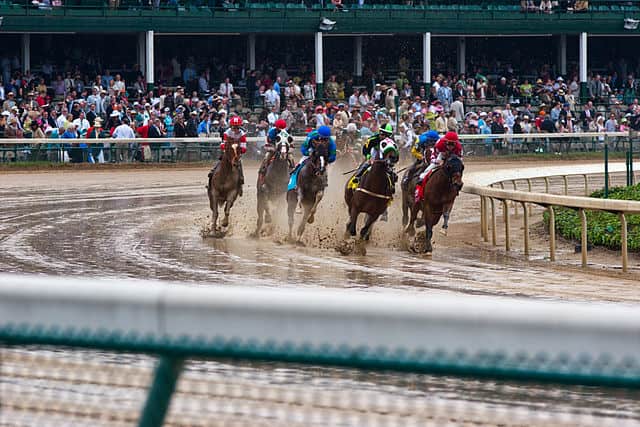The history of black jockeys is shrouded in slavery and racial discrimination. If you watch the Kentucky Derby, you’ll struggle to find African-American jockeys. There weren’t any black jockeys in the 2023 race, an occurrence that’s become normalized. In 2021, Kendrick Carmouche tried to be the first black man to win the race in over a century.
It was also the sixth time that a black jockey competed in the biggest horse race in America. That said, it wasn’t always like this. Black jockeys dominated the sport in the 19th century. Out of the 15 horses in the first Kentucky Derby, 13 were ridden by black jockeys. They won 15 out of the first 28 races there. What led to their disappearance? In this article, we recount the history of black jockeys.
Become an insider. Subscribe to our newsletter for more top trending stories like this!
To get into racing, you can look up horse racing equipment on Amazon.
People Also Read: Simone Biles Triumphant Return to Gymnastics
Rise of Black Jockeys
The history of black jockeys began before the first Kentucky Derby race happened. During their enslavement, they trained and rode them in the vast plantations they worked at. The Kentucky Derby Museum’s Director of Curatorial and Education Affairs, Chris Goodlett, talked to Wave3.com about their history.
“African Americans ran the plantations in the South. They took care of, trained and rode the horses, which explains how they formed the connection with the horses.”
On 17 May 1875, when the first Kentucky Derby race took place, the flair that black jockeys cultivated with the horses sprung out. H. Price McGrath presented two races: Aristides and Chesapeake. African-American rider Oliver Lewis was on Aristides, which Ansel Williamson trained.
During the race down the Churchill Downs track, the two horses were supposed to take turns. First, Aristides was to the track and then let Chesapeake take over, but it went on to record a stunning victory. It signaled that free black men could become successful. Enslaved men also used horse racing to earn freedom.
For example, Charles Stewart traveled to the North and South with his master William Johnson’s permission and ended up running an entire string of horses. He earned up to $300 to ride horses, an amount that slaves wouldn’t even think of.
People Also Read: Kelvin Kiptum, The Amazing Marathon Runner No One Expected to Break the World Record
Famous Black Jockeys
In the subsequent events, black jockeys won 15 out of the first 28 races at the Kentucky Derby, one of the three most prestigious horse race events. In the first race, 13 of the 15 horses were ridden by black jockeys.
Isaac Murphy was one of the most iconic riders of the time. He won the Kentucky Derby thrice and was also the first to be inducted into the National Museum of Racing Hall of Fame.
His victories allowed him to amass a fortune, and he was a figure that most people within the black community admired. Goodlet acknowledged, “Isaac Murphy is regarded as the greatest jockey that ever lived.”
During that time, other black jockeys that raced include:
- Willie Sims.
- Soup Perkins.
- Pike Barnes.
- Jimmy Winkfield.
- Alonzi Clayton.
Deepen your knowledge of horse racing by getting these books from Amazon.
People Also Read: Black American Athletes Who Made a Difference in Sports
Become an insider. Subscribe to our newsletter for more top trending stories like this!
Black Jockeys Erasure From the Sport
This is a sad part of the history of black jockeys. Unfortunately, their success attracted envy among their white counterparts. They used intimidation practices that drove black jockeys out of the sport.
Isaac Murphy was accused of being intoxicated at work. Despite these allegations, Dudley Allen, the only black owner of the Kentucky Derby racer, retained him as a racer. Unfortunately, Murphy died in 1896.
As horse racing morphed into a business, blacks got the same amount of money as white jockeys, and they didn’t like that. They also took advantage of the implementation of Jim Crow-era laws that legalized segregation.
Join our Spotcovery Global Black Community Facebook Group for early access to exclusive content and to share in a lively discussion.
Intimidation and Racism
The pens, which were once uniform, became divided. During the race, white jockeys raced alongside a black jockey and kicked them off the saddle. When whipping their horses, they did it close enough to a black jockey such that they’d cut them.
Consequently, white horse owners let black jockeys go because they were fearful of injuries the horses could suffer. As a result, black jockeys got fewer opportunities, and their presence in the sport diminished.
The demand for segregated competitions, the refusal to give African-Americans licenses, and the ban from racetracks contributed to the extinction of black jockeys from the sport.
Some black jockeys left America and continued their careers in Europe. Jimmy Winkfield went to Russia and established himself. The Bolshevik Revolution forced him to move to France. In 1902, the last black jockey Winkfield won the Kentucky Derby.
By 1921, there weren’t any black jockeys in the sport. In 2000, Marlon St. Julien competed in the Kentucky Derby, the first African-American in 79 years. Since then, other black jockeys who’ve raced include Kevin Krigger and Kendrick Carmouche.
The history of black jockeys shows how difficult it is to repair the damage done. Even today, horseracing remains largely white and is inaccessible to black people. African-Americans haven’t enjoyed the sport they built and rarely received the credit they deserved.
You can get any sporting equipment at Amazon.
Nearly 80% of consumers visit directories with reviews to find a local business. List your business for free in our exclusive Spotcovery Black-Owned Business Directory.
Spotcovery offers unique and fresh daily content on Black culture, lifestyle, and experiences. We talk about everything black, black people, black-owned and black-owned businesses. We also deliver authentic and relevant content that will inform, inspire, and empower you! The future of black media is critical to today’s black experience! Our primary audience includes African Americans, Africans, Afro-Caribbean, and people of African heritage. Black culture is for the culture!
Become an insider. Subscribe to our newsletter for more top trending stories like this!





